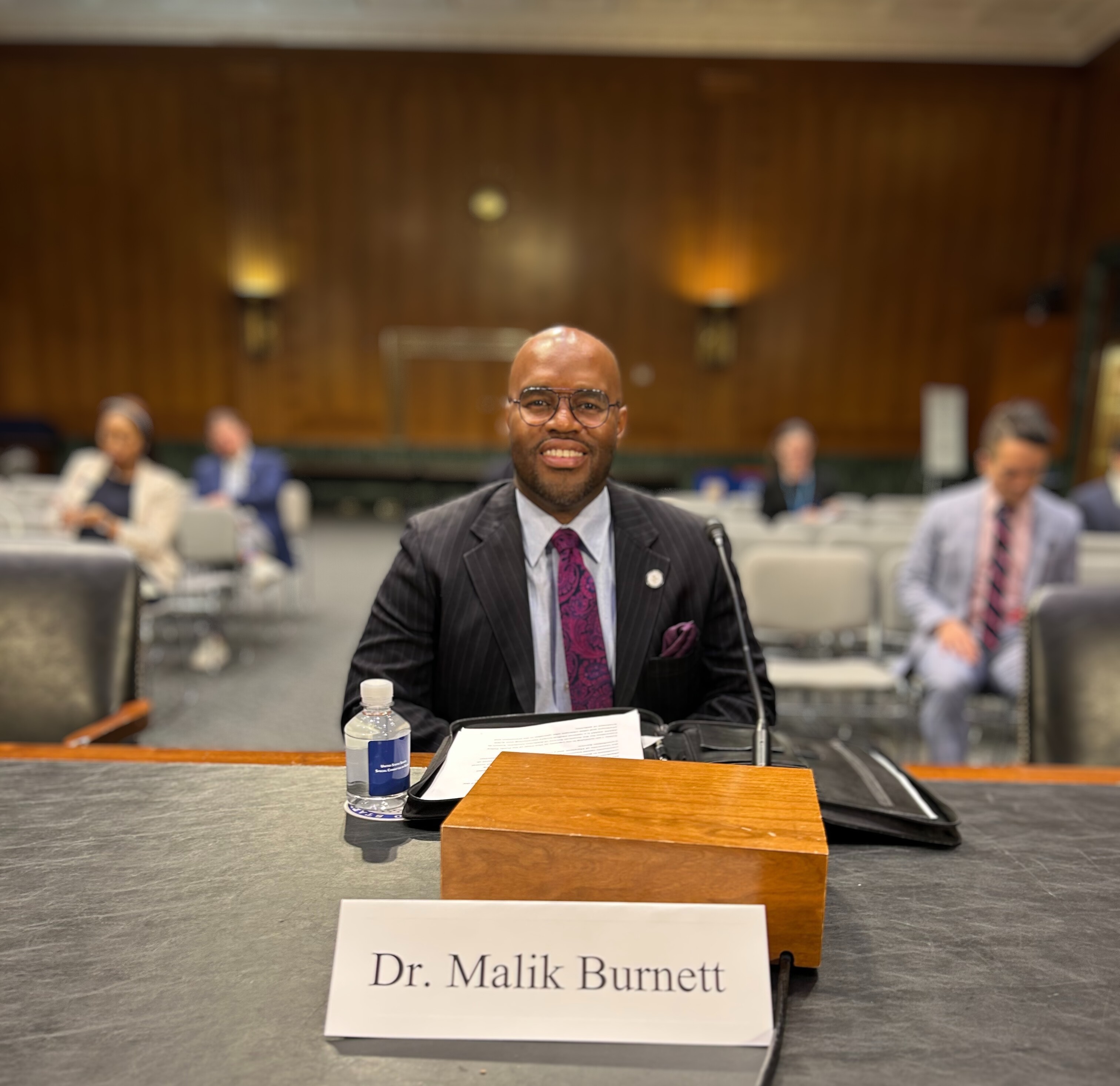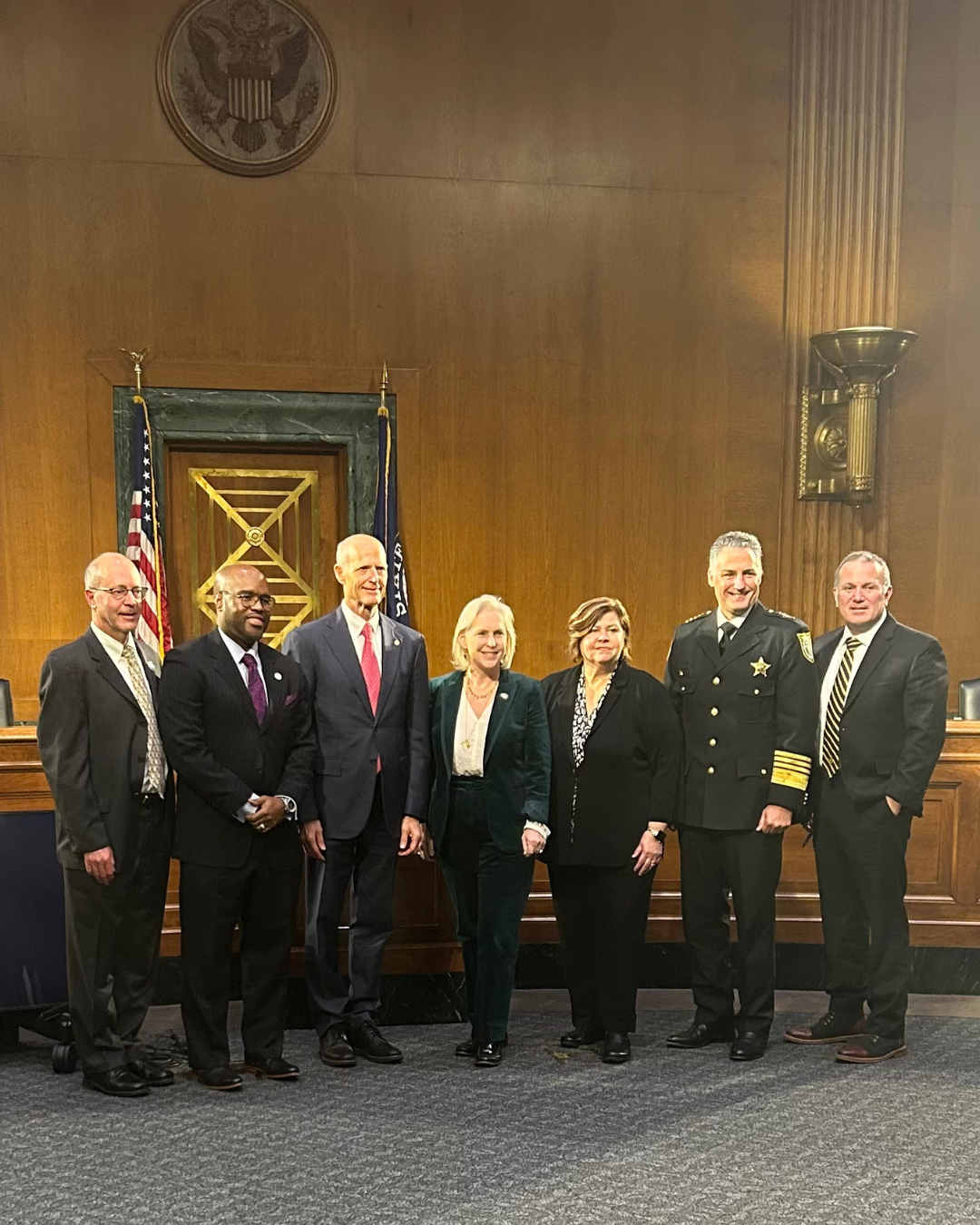Blog
From the Clinic to Capitol Hill: Addiction Advocacy
It’s been a busy start to 2025 for ASAM member and advocate Malik Burnett, MD, MBA, MPH, FASAM. Dr. Burnett, who currently serves as vice chair of ASAM’s Public Policy Committee and a member of the Legislative Advocacy Committee, has been making the rounds on Capitol Hill and speaking with Members of Congress about critical policies to improve access to evidence-based addiction care. Earlier this year, he testified before the US Senate Special Committee on Aging at a hearing titled “Combating the Opioid Epidemic,” during which he urged lawmakers to increase federal funding for addiction medicine and addiction psychiatry fellowships, close the Medicare coverage gap for residential addiction treatment, and avoid harmful Medicaid cuts, among other policy actions to effectively address the ongoing addiction and overdose crisis

“Unfortunately, the people who need these treatments the most are not getting the lifesaving care they need, when they need it,” said Dr. Burnett in his testimony. “In fact, this treatment gap has barely budged over the last decade. We will not end this opioid epidemic until evidence-based addiction treatment is easier to get than illicit opioids.”
Dr. Burnett returned to D.C. on April 1 to brief members of the House of Representatives and their staff about sustainable funding to support access to prevention, treatment, and recovery services.
In this Q&A, Dr. Burnett shares highlights from his recent time on Capitol Hill, discusses the power of storytelling in advocacy, and reflects on how he has grown as an advocate during his time at ASAM.
There were several important policy recommendations highlighted in your testimony to the Senate Special Committee on Aging. Which would specifically improve SUD care for older adults?
Congress can really do a lot of things to strengthen Medicare coverage, such as ensuring that the Mental Health Parity and Addiction Equity Act applies to Medicare, which it currently does not.
There’s also non-hospital residential substance use disorder (SUD) treatment which is not covered by Medicare. As we know, residential SUD treatment can be very expensive. If you can’t use Medicare to cover those stays, it really limits the ability for seniors to be able to get to higher levels of care for their SUD treatment needs.
Medicare’s SUD office-based bundle payment system can also be revitalized or revamped to ensure that reimbursements for office-based care are pegged to inflation and that more providers in the office-based setting are willing to engage in SUD care with this demographic. A lot of time it’s barriers to or concerns about reimbursements that really limit providers’ engagement and willingness to provide SUD care to this population.
You started your testimony by sharing your experience caring for people with SUD in Baltimore. How do those personal stories impact your advocacy message?
Stories help crystallize information. Sometimes in the universe of research and science, we generally lock up the key information behind statistics and data, and that makes it inaccessible to the lay person on the street or to the elected official weighing different pieces of legislation.
Providing stories of patient experiences or your personal experience as a health care professional giving this type of care really helps illustrate some of the evidence, data, research, and policy implications that otherwise might get lost in the banality of legislation and regulation.
Being able to explicitly say, “Hey, I had this patient experience which was definitively impacted by this piece of legislation,” or, “We can't do a certain thing because of the way a particular regulation is being implemented, and that's detrimental to this person's care,” really helps to illustrate the importance of why certain policy positions are being advocated for in the halls of Congress and other legislative bodies.
Right before the hearing, the CDC released new data that show a remarkable decline in overdose deaths. But we still have a long way to go. Do you worry that initial positive data might reduce the sense of urgency to address this crisis?
Part of what we're seeing relative to the reduction in overdose rates is the return on investment from engaging in community-based work, focusing on harm reduction-related services, engaging people in treatment, being able to meet people where they are at, and the ending of the COVID-19 pandemic. That was a major public health issue that certainly raised the number of total deaths across every single metric of public health morbidity and mortality for all diseases.
I'm hopeful that what we don't do is take our foot off the gas relative to the investments in that community-based work because I think we can really get some dividends over the long term and continue to push the numbers down. All overdose deaths are preventable -- 100% of them are preventable. And so, to the extent that we can get the numbers down to zero, then it'll be time to celebrate. But now, the job's not finished. I think that's something that the late, great Kobe Bryant said when the LA Lakers were in the middle of the finals and they got up 2-0, right? Can't celebrate because the job's not finished.
You’ve been involved in advocacy for several years now. Looking back, how have you grown as an advocate through ASAM?
I was involved in more high-level drug policy when I first started doing this work at another organization largely focused on cannabis policy reform. There were a lot of similar issues, like trying to shift the drug policy approach from a criminal justice framework to a public health framework.

I think where I've grown most over the past couple years, and I can certainly credit ASAM for this, is in becoming more up to speed on all the various nuances and policy-related issues that are specific to SUD treatment.
The SUD universe is a much more complicated universe than cannabis policy reform, because there is activity happening in the arena of SUD treatment that has implications for all sorts of different regulations, whether it be from telemedicine-related issues to payment and financing mechanisms to treatment standards. One thing I'll say about ASAM is they do a great job of organizing all that information and allowing you to access it, understand it very easily, and put you in positions to be able to continue to fight for that shift from criminal justice to public health.
Image: Dr. Burnett (second from left) with Senate Aging Committee Chairman Sen. Rick Scott (third from left), Ranking Member Sen. Kirsten Gillibrand (center), and fellow witnesses.
For the latest policy news, updates, and insights from ASAM Advocacy, subscribe to the monthly ASAM Advocate newsletter. View past editions and sign-up for updates here.
